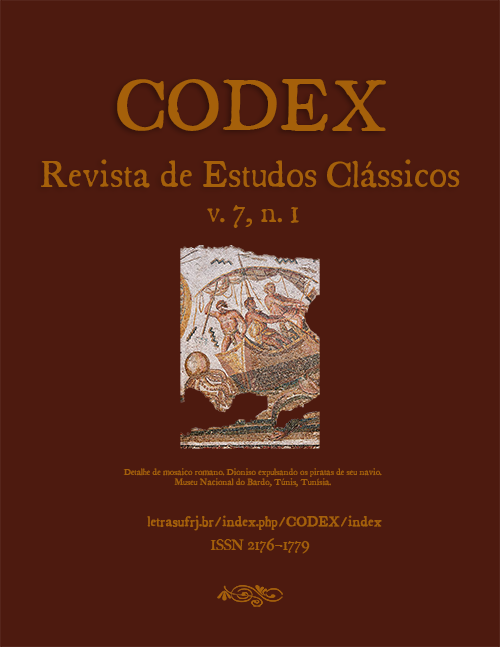Oedipus, Odysseus and the Return of Memory
DOI:
https://doi.org/10.25187/codex.v7i1.22186Palavras-chave:
Odysseus’ scar, Erich Auerbach, Mimesis, Analogy, Comparative literature, Akedah, Childhood memory, Forgetfulness, Oedipus Rex, Repression, Jewish identityResumo
The analogy between Oedipus and Odysseus is striking and provides an intriguing case of intertextuality once their relationship is investigated through the fascinating links that the plot of Sophocles’ Oedipus Rexmaintains with the episode of the foot washing of the Odyssey, Book 19. I argue, that the Homeric Odysseus provided Sophocles with an inspiring model for imitation: A middle-aged man carries on his body a childhood scar of which he has been oblivious for many years. After many years of absence, a homecoming brings with it a return of memory: the traumatic scarification begins to surface. Oedipus’ and Odysseus’ scars bring home something that has collapsed into forgetfulness. Returning to Auerbach’s “Odysseus Scar” the article discusses the scar as a junction of forgetting and remembering and show how Odysseus’ memory and Oedipus’ forgetfulness are intertwined.
Downloads
Referências
Auerbach, E. Mimesis: The Representation of Reality in Western Literature. Princeton: Princeton University Press, 1974.
Caruth, C. Unclaimed Experience: Trauma, Narrative, and History. Baltimore: The Johns Hopkins University Press, 1996.
Doherty, L. Siren Songs: Gender, Audiences, and Narratives in the Odyssey. Ann Arbor: University of Michigan Press, 1995.
HOMER. Odyssey. Translated by James Huddleston, 2006. Electronic edition: http://digital.library.northwestern.edu/homer/.
LEV KENAAN, V. The Ancient Unconscious: Psychoanalysis and Classical Texts. Oxford: Oxford University Press, 2019.
Nagy, G. Greek Mythology and Poetics. Ithaca: Cornell University Press, 1990.
PORTER, J. “Erich Auerbach and the Judaizing of Philology”. Classical Inquiry, 35.1, 2008, pp. 115-147.
Shahar, G. “Auerbach’s Scars: Judaism and the Question of Literature”. The Jewish Quarterly Review, 101, 2011, pp. 604-630.
SOPHOCLES. “Oedipus the King”. In: _______. vol. 1. With an English translation by F. Storr. Cambridge: Harvard University Press, 1912.
_______. Oedipus Rex. Commentaries by DAWE, R. D. Cambridge: Cambridge University Press, 1982.
Vernant, J.-P. “Oedipus without the Complex”. In: _______. & Vidal-Naquet, P. Myth and Tragedy in Ancient Greece. 2. ed. Translated by Janet Lloyd. New York: Zone Books, 1988, pp. 85-112.
Downloads
Publicado
Como Citar
Edição
Seção
Licença
A Codex - Revista de Estudos Clássicos utiliza uma licença Creative Commons - Atribuição-NãoComercial 4.0 Internacional.
Os autores dos trabalhos aprovados autorizam a revista a, após a publicação, ceder seu conteúdo para reprodução em indexadores de conteúdo, bibliotecas virtuais e similares.
A revista se permite o uso dos trabalhos publicados para fins não comerciais, incluindo o direito de enviar o trabalho para bases de dados de acesso público.










